29/02/2016
In her foreward to the first edition of Every One, published to coincide with the Royal Lyceum production in 2010, Jo Clifford wrote about a number of women living in proximity to death: herself following the death of her wife Susie, and her own experience of heart surgery; a friend whose mother had died; her mother-in-law, whose health was declining; a friend with incurable kidney failure. Harrowing, you might think, but Jo demurs: “Closeness to death does not depress or frighten me. On the contrary, it seems to heighten my appreciation of life.”
I’m not sure how immediate it is that Every One is a play about living. But maybe I say that to cover my tracks, or my obtuseness: it certainly wasn’t clear to me when I first read it. I felt it was telling me about how it might be when my mum dies, and how it might be when I die: I didn’t catch it telling me what to do with myself in between. That realisation struck on the first day in the rehearsal room, listening to the cast read through it: I heard it so differently through their mouths and brains.
Since then, I’ve wanted to speak to other theatre-makers whose work contemplates death, to see if I might have missed something in what they say about being alive, because “appreciation of life” isn’t something I often feel. Jo Bannon was the first to come to mind, partly because she’s brilliant and I adore her, partly because my experience of her work Dead Line was fraught and I’ve always wanted another conversation with her about it. I saw it in Bristol as part of In Between Time/IBT13, with some trepidation, because in the IBT brochure it was described as: “a live encounter that creates a space to talk a little more openly, about our fears, hopes and desires for living and dying” that “invites you to confront your own mortality, to ask another what you daren’t even ask yourself. It’s a one-to-one encounter that will help you sleep at night.” I was very much running at the words “confront” and “one-to-one”.
Accounting for memory glitches, Dead Line in 2013 went roughly like this: it’s a work in three parts, the first of which is in a public space – in Bristol, an empty shop, which had been decorated to look like a waiting room, with a squashy sofa and literature to do with dying, coffins, etc, scattered on the coffee table. From there I was led upstairs to a darker, closeted room, where I sat at a desk facing an old-fashioned dial-up phone, bright red. There was a questionnaire, and my answers led me to a conversation with a death “specialist”: perhaps someone who works in cancer care, or someone who works in a funeral parlour. We chatted for a few minutes, and after hanging up the phone I was led to another room, also empty, but brighter, painted white, open in feel. The room had a huge window, opposite I could see a historic building and the square of green in front of it; the sky above was bright but I no longer remember if it was blue or chalky. Circling the window was a row of light-bulbs that slowly illuminated until their glare became as strong as the sun. I no longer remember if the sound I heard in those moments was the rising of instruments being played from a stereo or a crashing in my own brain. The lights went out, and that was the end.
I remember bumping into someone else who had experienced Dead Line before me and being struck by how tearful she was. I wasn’t tearful when I saw it: I was the kind of emotional that doesn’t know what it is, except uncomfortable, a minor burn. I bumped into Jo outside the Arnolfini and had a quick, fierce conversation with her about the work: I wanted to know where it had come from and what she wanted it to do, because I felt I was not the right audience for it. As will become clear in the following transcript, of a longer but still too-hurried conversation we had on the phone, on 18 February 2016, almost exactly three years later.
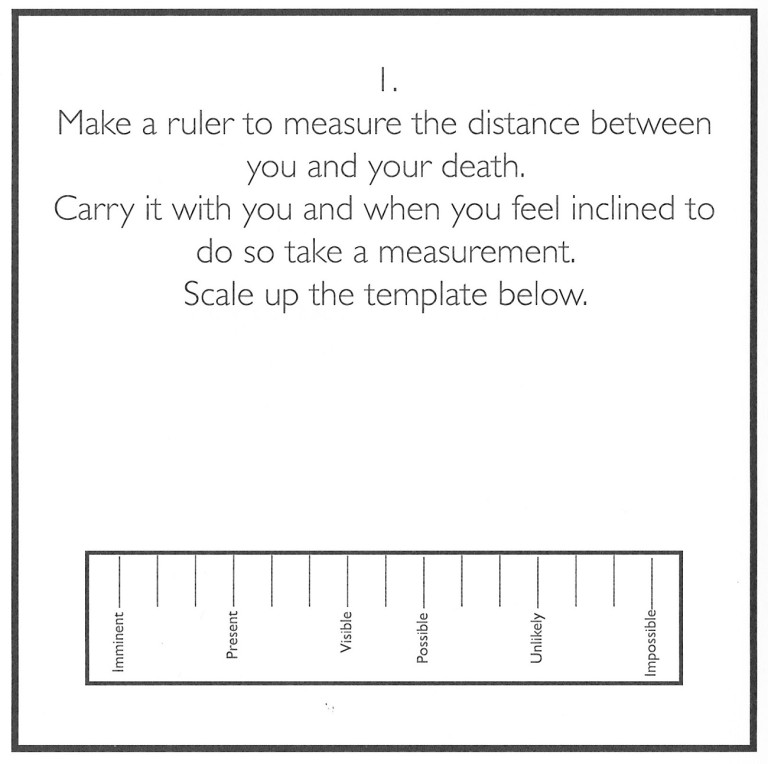
M: One of the things we’ve talked about in the rehearsal room for Every One is what happened when Chris’ grandmother died: he was four, and the message that was communicated to him was that she had “collapsed and died”. And he just didn’t understand, so he made lots of notices and pinned them up around the house, calling a family meeting to discuss how a person can collapse and die. And because Every One is being staged in the Council Chamber at BAC, there’s a sense in which he’s thinking of the production as calling a meeting to discuss how we die, and how we don’t talk about dying, and there’s no way of preparing for dying. He’s also told us about a conversation he had with Jo Clifford in which the two of them saw a poster for the National Childbirth Trust, and Jo said: “Isn’t it extraordinary that we have lessons to learn how to give birth, but there are no lessons to learn how to die?” So that completely made me think of Dead Line, because that was a lot of what the telephone conversation bit was about as well: how do we find space to learn about how to talk about this, whether it’s for ourselves or dealing with bereavement.
So: where shall we start?
J: Shall I talk about where it came from? I caveat all of this with it began quite a long time ago, so I might be vague or untruthful with the answers because I might not remember. I started making the project, doing the research, with another artist, Lucy Cassidy: we were making it together for maybe the first year of its life, then she stepped away due to other commitments. I guess it started with Lucy and I having a conversation about how we were both turning 30 that year: I know that isn’t a great age, hopefully that’s not too near the end of my life, but I think I am one of those people who does all of that weird reflecting as decades change from one to another.
Lucy was talking about turning 30 and having never seen a dead body or never seen anyone die: presumably her grandparents had died but she wasn’t there, she wasn’t invited, she wasn’t in direct contact. Whereas I have a really strong memory of watching my grandmother die when I was about 7 or 8. I guess that’s quite culturally specific: my family are Catholic, from Ireland. We were living in England but my dad got a phone call saying, ‘Your mum’s dying, you need to get here’, so we rushed in classic filmic fashion to the deathbed. She was literally dying at home, in her bed, and the tradition was for the family to do a vigil and sit with her, for however many days that took.
I remember – and this was practical, because they had nowhere else to put me – being allowed to sit in that room, and it’s such a powerful memory for me. I remember us sitting around her bed, and her breathing really fluctuating. I hate using mystical language around death, because I don’t think it’s very helpful, but at the same time there was something about that experience that I can’t quite talk about. I knew that she was dying and no one had to tell me that. Human to human it was clear, and the tone and atmosphere of that room was very unusual: that is a tone and atmosphere that is only there when someone is dying. Also, her death was kind of funny, because I’m sat round with all of my weird Irish family, and her breathing was really erratic, and I remember her farting and that was hilarious to me.
I guess what it taught me is that that kind of death is a process. It was a labour, like a birthing labour, it took energy and time. And when she finally did die, again the room changed, the feeling in the room was just different. I’ve always returned to that memory because I can’t work out why it was different: someone did eventually check but we didn’t have to, we knew, it was so clear.
In comparison with Lucy’s experience, that’s very different, because I was there and in some way I felt like I knew something about dying. But what does that teach me about my own relationship to death? I mean, I was young, but even watching someone else die, I still didn’t believe that that thing could happen or would happen to me. And I still don’t, on some major level, believe that I will die. I know I will, but I don’t believe it.
I suppose that was the question that began the project: is there a way to get closer to believing it? Is that useful? Is it morbid? What happens when there’s more space to talk about this? I felt similarly to what Jo Clifford said about the childbirth poster: how do we not know anything about this, when the only certainty is we know we’re going to do this? Really the research process was: since we don’t know very much, who can we talk to, to ask some questions? The first person we met was this extraordinary academic working in death: we sat in his living room and after five minutes of pleasantries we had this vital, very intense, intimate conversation about dying, and I felt like, this is a real privilege. In a way that’s what the project became: many months later, I knew that what I wanted was to create that experience for other people. But it took a long process to realise that the project was a re-enactment of what our process had been.
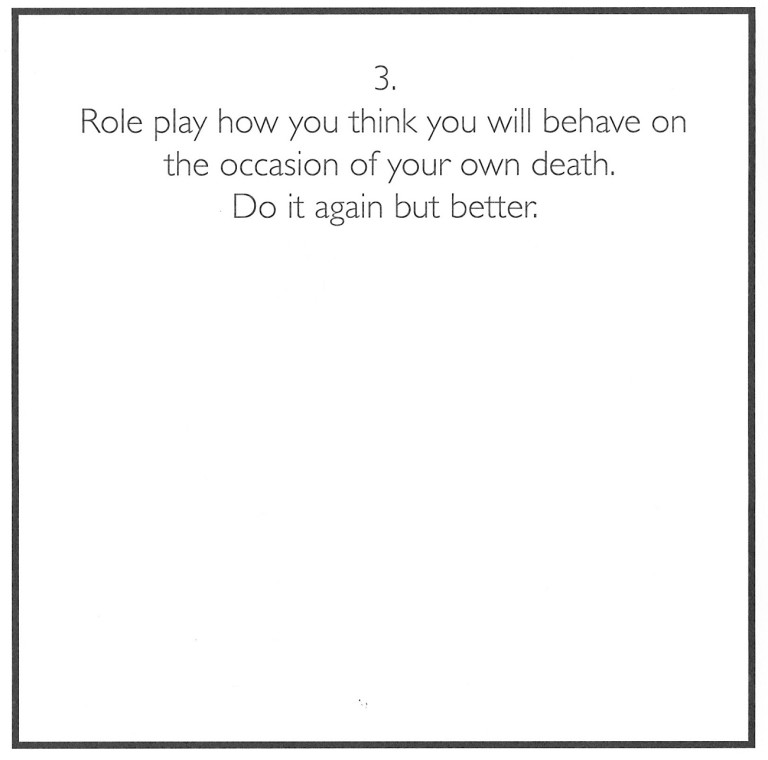
M: I think when I saw it at IBT13, you were in the thick of that turning 30/life milestone thing, and we talked quite a lot about you lying awake and feeling really anxious about dying. I really like the idea that the work is attempting to be a gift, opening up a space in which people can talk and think about these things.
J: The work had a number of rooms, there was the reception area, and then the phone call room, and then this kind of decompression space, and we talked about that first space for a long time: at IBT it was in a shop on the high street, and we tried to make that room look like a civic space, like a doctor’s surgery, or a place you might pay council tax or something. Because there was always a provocation within us about: what if Dead Line, the phone service, was a civic service, like ante-natal classes? What if this was a hotline that you could call at any point and talk to a soul midwife or a funeral director or whatever? We have the Samaritans, we have lots of advice or support lines, but not really about this. So yes, that idea of gift or maybe civic service, embedded in society, is how I’d think about it – but I’m also wary of how that language sounds a bit descriptive or do-goody.
M: We had a bit of a conversation about Dead Line after I saw it, because at the time – looking back I can see this – I was somewhere in a two-year depression cycle, during which I was having lots of suicidal impulses, so in some ways it felt like absolutely the wrong work for me, because I was thinking about my death altogether too much. Which is where our conversation in 2013 started. So I’ve been really interested in some of the other conversations you’ve had with people about it, and how people responded for whom it did perform that civic function.
J: I remember that conversation and I’d be interested to return to your reaction and think about what it was like for you at that time, and now.
M: The thing I specifically remember saying at the time – and I still need this – is I need help with living, and coping with living almost, and so the difficult bit for me was the final room, the end of the journey, having had the conversation with the specialist, where you’re – it’s interesting to think of it as a decompression space, because I don’t think I understood it as that, I think I thought of it as a space in which you would sit and think, ‘I’m going to die and it’s OK.’ Not even necessarily think about how it’s going to happen but have a moment of it’s OK, the sky is amazing, the world is amazing, make the most of that while we’re here. Which again is the kind of phrasing that, as it comes out of your mouth, you just go: that’s so glib. And that’s part of our problem as humans: it’s really hard to say ‘the sky is amazing!’ and not have 98% of people think you’re a bit of an idiot.
That room felt difficult for me, I think because I’m constantly aware I’m going to die, to the point sometimes of just wanting to get on with it, and what really exasperates me is all the things I won’t get done before that point. Sometimes the feeling of just wanting to get on with it, it’s almost the same conversation I had with my husband about having children: if we’re going to do it, let’s just get on with it and do it now, let’s get it out of the way. I sort of feel like that about death as well. Sometimes, not all the time.
J: So that room having that other function was too contrary to where you were at that time? Because I agree that that room – well I would say that the whole work is about living, it’s about living with dying. When people say it’s about death I’m always a bit contrary about that: people make of it what they want, I’m not saying it is or it isn’t, but for me, they’re conversations about living. I definitely think that room has that function you describe, and some people experience it with that function, but I also question that, because what I don’t want the work to do is simplify: it’s not like you can have this conversation then sit in a room and it’s fine. It’s not fine. I don’t know about you but I do want to die and I don’t want to die, it’s complicated, and this work isn’t going to make it better. So I know what you mean about that space.
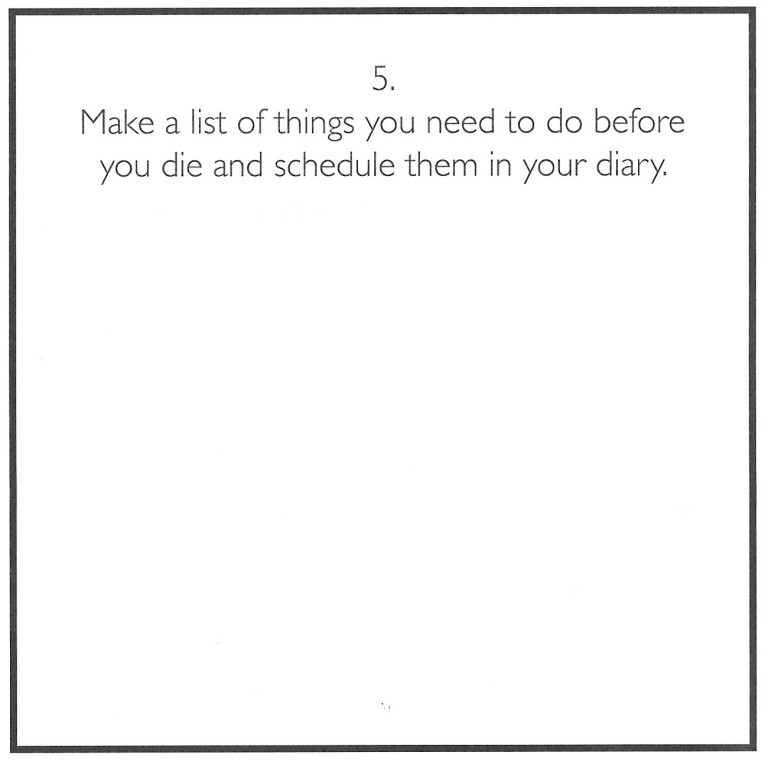
M: It’s interesting, with Every One, it shows a death but that doesn’t mean it’s about death, it means it’s about living, and that’s the thing I really realised on my third read of it – but not on my first read necessarily, that’s not the thing that’s immediately obvious about it. There is something interesting about that: if we’re going to look at death in art, then we’re going to do it to understand more about being alive.
J: I think so, and I think it’s also true of – like, hearing from specialists about what people talk about on the phone, and what they ask, and what their concerns are, and hearing responses afterwards, the questions aren’t really about dying, or the moment of death. I think dying might actually be quite easy, however it happens, the actual moment from on to off, if we can put it as crudely as that, I think that’s probably OK. I think the questions are about living with death: they’re around pain or lack of control or unknownness, when and how and how do we enjoy life while knowing that everything is unstable and brief. So I think we’re not obsessed with death –
M: We’re all struggling with the how to live bit.
J: Yes. In the research, one of the most interesting meetings – I couldn’t get them on the phone sadly, but they would have been my favourite specialists – was with these two girls aged five and seven. I was interested in the moment that we know about our own death, there’s definitely a childhood state of not knowing, and then this idea that once you know you can’t ever un-know it. And what was interesting about those two girls was, they were quite similar in age but definitely the seven-year-old had it much more locked down: she knew and it was quite black and white, whereas the five-year-old had this really beautiful, quite lucid relationship with death, she was absurd and non-sequitur in the way she talked. So she’d say: ‘our guinea pig died and it had angel wings and it flew to heaven and then we put it in the bin’, and then she’d talk about bones. It was really unclear, her definition was quite usefully unclear. The sadness in that was I felt like the seven-year-old had already repressed it or put it away somehow. That five-year-old to me would be a great specialist, because I felt that she had it nailed: that’s how you live with death. It’s kind of amorphous and funny and unclear.
M: There’s something we’ve been talking about in the rehearsal room: apart from the four characters of the family there’s also the mother of the mother, who has Alzheimer’s. She talks about how she’s living in another dimension at the same time as living in this dimension, and the other dimension is probably more fun than this one. There’s something there to do with how we structure society and our expectations of ‘normality’, and the five-year-old has that sense of multi-dimensionality that is hammered out of us really early. How much healthier an existence we might have if we were allowed to maintain it is an interesting question.
J: And I think something that was always concurrent with the people who became Dead Line specialists was they have a multi-dimensionality, and a kind of humour. That’s not to say they’re not serious in their work, but I think that might be closer to the experience of death, it’s a lot of types of things. I really resist the idea of morbidity around the subject: I think we’ve got stuck in quite a static, repressive, formal relationship to death, and I think that’s a lot to do with the Victorian era of dying. When I talk to people about being around my grandmother’s bed, they still find it shocking that I was allowed to be in that room. But we weren’t at a sky burial: on the scale of things it’s still relatively regular.
It’s interesting to think about Alzheimer’s and also the five-year-old: time is an interesting dimension there, when time is a bit free then it’s less about ‘that person was alive and now they’re dead’. Maybe living in different dimensions or different times allows a freer association with death, it’s less clear-cut.
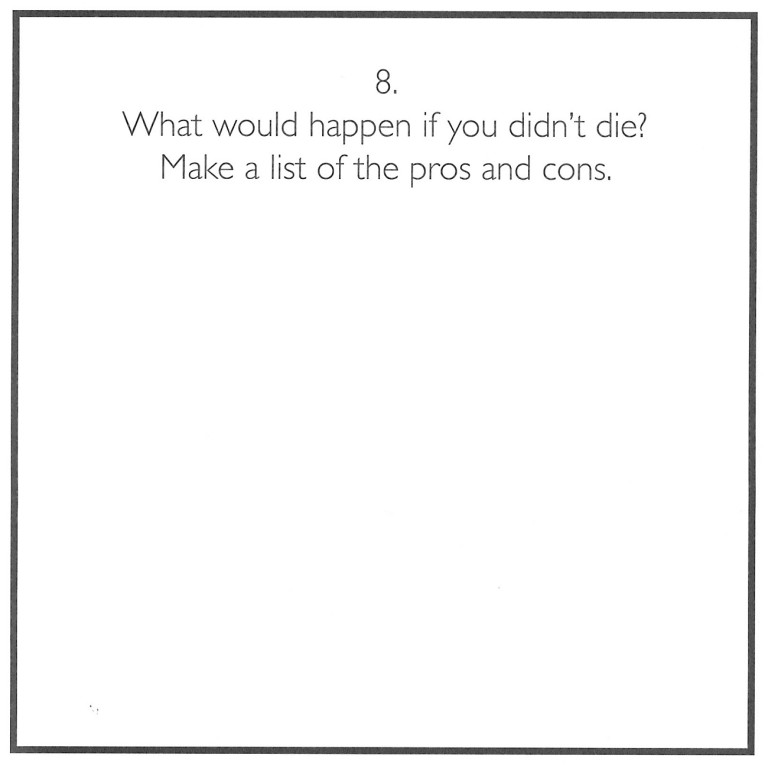
M: Where are you now with this? What difference did the work make for you, and was that different to the conversations you had with people who experienced the work?
J: I definitely think something changed for me, in that first year of the work going to meet these people. Maybe it’s a crude example but when you’ve talked to an embalmer about the exact process of embalming, you can’t not know it. But also she was this incredible woman who’s an Aids activist – at a certain point in the 80s you weren’t allowed to be embalmed if you had HIV, all this stigma around blood. The people that I met had this incredible empathy to the world and there was something that was calming about that. It’s still unknown but there’s a bit of knownness. And there were some practical things: I visited quite a few hospices and I was like, these are amazing spaces, if this is how it goes then this is a nice space. Just talking about it a lot does demystify it, because you get a bit bored with it in the end, and it isn’t a taboo any more – it is and it isn’t. When you’re in close proximity to it, it’s like a practice, a daily practice, so that definitely wore down that unhelpful mysticism.
I should also tell you, I got invited to remake the work in Australia last year, and I was thinking about the role of the specialists. There had always been a concern for me about how quickly or, not quickly, how much the specialists could drive the conversation towards a conversation about your own death: that was what I always wanted to happen on the phone, but if I got on the phone to an embalmer, I wouldn’t want to talk about me, I’d have a hundred questions to ask. So I always questioned how effective is this work: how effectively does it get to this point where I think the really interesting stuff can happen? So in Australia I decided to test out what it was like to be on the end of the phone and I became the person you spoke to in Dead Line.
M: And you were the only person?
J: I was the only person, yes. As a challenge to myself I thought: I’m gonna do it. Which was so fascinating – problematic for me, there was a big question about whether I am specialist, or am a specialist. In some ways I’ve spent a long time talking to people and researching death, and all the specialists hated being called specialists, they’d say, I can only give my knowledge.
Over 10 days I had 120 conversations about death, dying, and that process really changed something for me. It was only in November so maybe I’m not quite at the point of reflecting properly on it, but I guess there was a humanity to that brief connection that I had never experienced first-hand. And there were certain themes that would continually come up or certain questions that people would always ask or things they would always say that made me feel really connected. We’re all just in this boat.
There was something really interesting in experiencing the work from the other side: I still stand behind the power it can have to have even a brief moment to try to get there, but I guess there was an acknowledgement of how difficult it is to get there and how we’re to some extent dealing with this all the time. Some of the conversations were for me pretty light and I don’t know if we got there, it’s not for me to say, and some conversations were immediately quite intense and emotionally full-on. I remember at the end of one conversation, the woman said to me: have a nice life. It really struck me, because we’re never going to meet: that was it, it was this moment of togetherness, convergence, and then we were going off in our different directions, and the real work was living – have a nice life – yeah, I’ll try, shall we try?
The thing I was talking to you about, I call it the 4am moment: you wake up and in that moment I know I’m going to die, not then but I am, and I guess what I’d say is making Dead Line definitely didn’t solve that, in loads of ways I’m none the wiser, and I don’t expect the audience having had that experience to be any the wiser. There was something about getting to know the work in a different way that was deeply satisfying, and I think it has altered things, but it’s not like – I know you’re not presuming that – it’s changed my relationship to dying. I’m still really scared of it, I still don’t really think it’s going to happen.
M: But you’ve had a conversation with it. I suppose that’s what it’s about. There’s a space for it, or for thinking about it.
J: Yes. I suppose I think of it as a daily practice: it’s at the core of Buddhism, having a daily practice around meditation, around your own death, I don’t necessarily mean that, but just allowing it to be in your life more in some way. That was in the aesthetic choices too: I never wanted it to look Victorian, or like it existed in another time, I wanted it to be beautiful but ordinary.
This is a side point, but: I’ve been listening to Dan Savage’s podcast, he’s a gay American agony uncle and a sex-positive person, so his language is sex-positive, and it’s queer and broad and encompassing and not moralistic. I’ve been listening to him for probably the past six months, and slowly he is changing my relationship to sex and making it feel more positive, making it feel more owned by me. Sex still feels really taboo, not to me but it is really taboo, but just having it around me more, it’s like a different vocabulary now. Sometimes I’ll say something and realise someone isn’t listening to Dan Savage and therefore thinks I’m really, I don’t know, crazy or slutty or whatever. Just having it around more makes it feel more normalised and makes me make better choices.
And that’s the thing about death: if we had it around more, if we had that conversation around more, what different choices might we make? And not just about dying: what different choices might we make about living and what we do with our time?
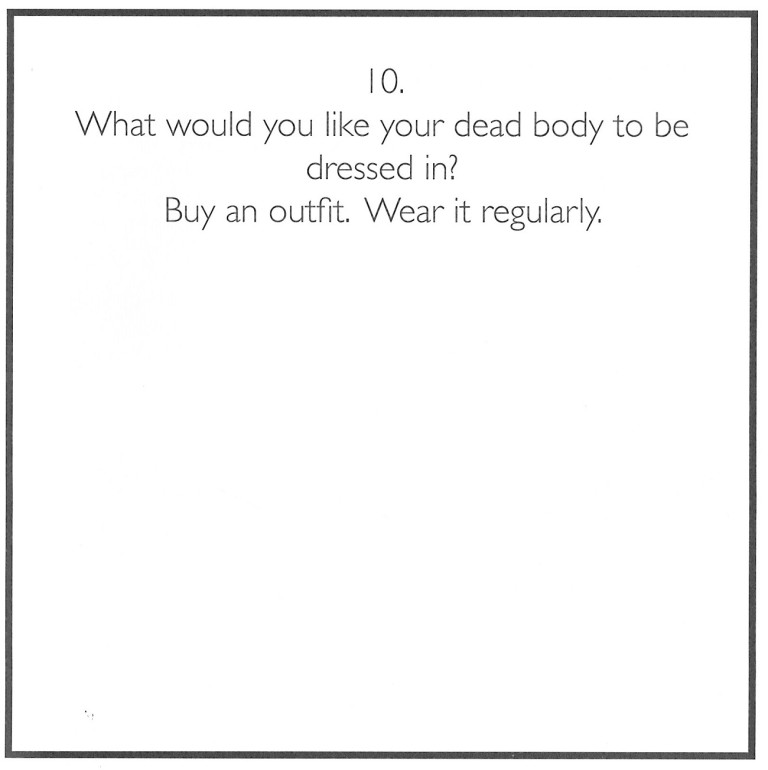
The images in this post are taken from Jo’s programme for Dead Line, a square white booklet that lists “10 ways to get closer to your own death”. I almost never want to keep theatre programmes, but this one is a prized possession, a source of wonder and the strangest of comforts.
On the day this post was published, Jo Bannon emailed me to say that our conversation had inspired her to do a little more reflecting on her experiences in Australia, and to do her own piece of writing. And so, as a postscript, here is her text.
Have a nice life
‘Have a nice life,’ you said.
For the longest time I couldn’t think of anything to say in reply. Time and silence stretched out between us and the fragile phone line connecting us seemed to tremble and catch its breath.
‘You too,’ I said, and the line went dead.
You too.
And now I am living in the time I thought about immediately after that exchange. The time of the future, the hours, days, months after that conversation. The distance that I knew would open up between us. Unmappable, unimaginable, at the time. Our lives splintering off, forking into unknowable directions. Likely never to converge again.
And I knew when you said it that we would never know the answer, never know for sure if each other had succeeded, to have a nice life. And that realization, at the time and whenever I think of it subsequently, catches in my throat.
Thinking on it now, it feels like one of the most honest, restrained and hopeful sentences anyone has ever uttered to me. It felt real and meant. It felt unabashedly basic and naive. It felt profound and yet, when retold, sounds stupid. It is the passionate retelling of a potent dream which feels dry in the mouth.
The conversation happened down a phone line, in Australia, at the tail end of 2015. It happened during a performance work of mine, Dead Line. It happened in the context of the work which proposed a brief, anonymous conversation with a stranger about our relationship to living with the knowledge of our own death.
It happened for you down a shiny red telephone. It happened for you in a minimalist 70s room with huge glass windows, lilies and ticking clock. It happened for me down a cheap beige telephone, in an adjoining kitchen with no natural light.
The conversation for you happened once. For me too. But earlier I had similar conversations with approximately 120 other audience members. Each one brought the promise of connection, conversation, confrontation. Guided by me, there was an attempt to make space for us to talk about our relationship to our own mortality. In many of the conversations I would ask, ‘what do you think or feel about your own death?’ There would often be a pause. And then each conversation would flow outwards in some unknowable, unrepeatable way. Sometimes there was the thrill of exposure - of saying too much - in others the realization of unbearable honesty; in some there were flights of academic and philosophical fancy; in some there were vast swathes of awkward silence. In some conversations we got there, wherever ‘there’ might be, in some we didn’t
With you I can’t remember. I can’t remember our conversation before that remark. I remember feeling a sensation of intimacy towards you, a charged space we had opened up together. But when you said those words to me, ‘have a nice life’, I dropped through the floor of a number of realisations, about Dead Line, about dying, about living, which have stayed with me ever since:
1. We would never meet. This was our time together. The briefest of moments. Totally anonymous. Happening and then gone.
2. We meant it when we told each other to ‘have a nice life’ and in this simple, hopeful, naive wish felt bound up all the pain and joy possible in the human condition.
3. We would never know if each other succeeded. And yet we would say it anyway. Then we would hang up the phone and let each other go.
4. That profoundly this is what I think we’re all doing. Trying to have a nice life. Trying to hope that others do. Dealing with the instability of an uncertain existence and a certain ending. Temporally dealing in meaningful relationships, holding each other tightly and lightly, down shaky phone lines, in silences filled with the faintest of breaths, in the process of living, and dying.
‘Have a nice life’
‘You too’



